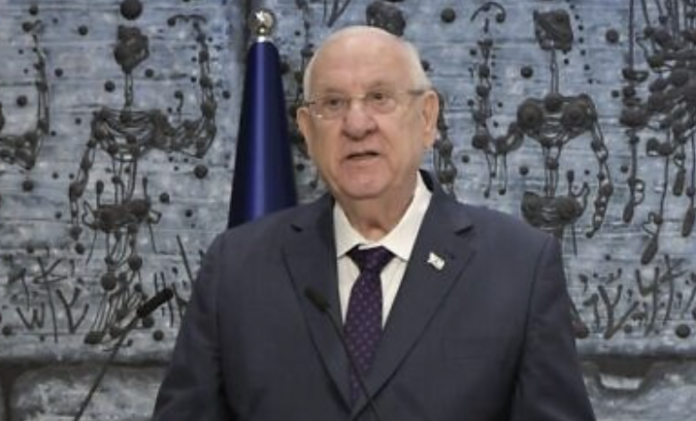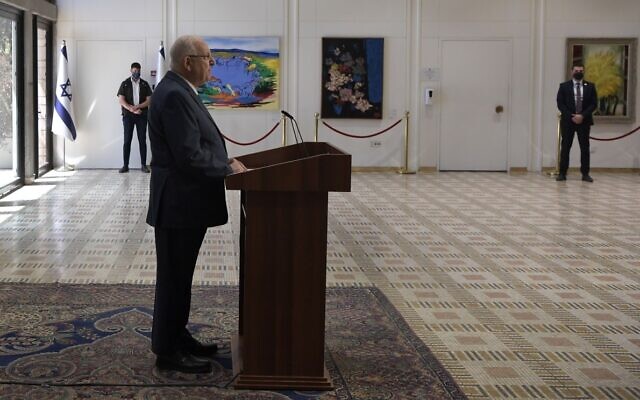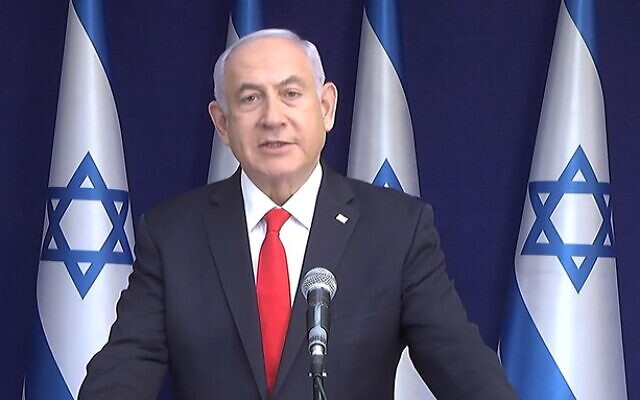President Reuven Rivlin on Monday gave Prime Minister Benjamin Netanyahu the first crack at forming a government but noted that he was doing so reluctantly, both because no party leader appeared to have enough support to succeed at cobbling together a ruling coalition and because he had “moral and ethical” reservations given that Netanyahu is on trial for corruption.
In announcing his choice, Rivlin spoke of his moral dilemma in light of Netanyahu’s ongoing corruption trial and the public discourse surrounding it, expressing his fears for the future of the country amid the divides that have resulted in four inconclusive elections.
“This is not an easy decision on a moral and ethical basis, in my mind,” Rivlin said. “And I fear for my country. But I am doing what is required of me as president of the State of Israel, according to the law and to the ruling of the court, and realizing the will of the sovereign – the Israeli people.”
Rivlin’s choice came a day after he held consultations with all party leaders in the Knesset to hear whom they will back to form a government. No party leader had the support of a majority of the Knesset’s 120 lawmakers.
“The results of the consultations, which were open to all [they were aired live], led me to believe that no candidate has a realistic chance of forming a government that will have the confidence of the Knesset,” he lamented. “In fact, if the law would allow me to do so, I would hand the decision back to the representatives of the people, to the Knesset.”
However, noting that he could not do so by law, Rivlin said the principal consideration was “which candidate has the best chance of forming a government that has the confidence of the new Knesset.”
The president stressed that while “the question of giving the role to a candidate facing criminal charges was one of intense political and public disagreement over the recent election campaigns,” he did not allow it to influence his decision, as to do so would be beyond his authority.
“I know the position held by many, that the president should not give the role to a candidate that is facing criminal charges. But according to the law and the decision of the courts, a prime minister can continue in his role even when he is facing charges,” he said.
“The president of the State of Israel is not a substitute for the legislature or for the judiciary,” added Rivlin.
Underlining his reservations over his decision, Rivlin did not invite Netanyahu to a ceremony formally tasking him with forming a government, as is the norm when a prospective prime minister is named.
Referring to Rivlin’s decision at a Likud faction meeting held Tuesday afternoon at the Knesset, Netanyahu urged political parties to end their “personal boycotts” and join his government.
The prime minister said he’ll make “every effort” to remove Israel from the “cycle of elections” and establish a “strong government for all of Israel’s citizens.”
“This won’t be a government of paralysis, but rather a government of action,” says Netanyahu. “To do this, the government must be united, both in policy and action. And to create it, we must first end the personal boycotts,” Netanyahu said.
He stressed that the establishment of a “strong and homogenous” coalition won’t be easy, but isn’t “impossible.”
Opposition leader MK Yair Lapid tweeted in response to Rivlin’s decision that the president “had fulfilled his duty and he had no choice but to give the mandate to Netanyahu,” but said it was “a shameful sign of disgrace that stains Israel and casts shame on our status as a law-abiding state.”
Netanyahu will now have 28 days to try to muster a coalition that can win majority support in the Knesset, but, given that he only has the backing of 52 out of 120 lawmakers, it will be a challenge.
Netanyahu was endorsed by his Likud party, with 30 seats, Shas, with 9; United Torah Judaism, 7; and Religious Zionism, 6.
Lapid was recommended as prime minister by 45 lawmakers (Yesh Atid 17, Blue and White 8, Yisrael Beytenu 7, Labor 7, Meretz 6), and Naftali Bennett by the seven members of his own Yamina party.
The three parties that made no recommendation account for the final 16 Knesset seats (New Hope 6, Joint List 6, and Ra’am 4).
Rivlin met Monday with representatives of all 13 parties that won Knesset seats in the March 23 election. The 120 MKs were being sworn in on Tuesday afternoon.
Meantime, at Jerusalem District Court, prosecution witness Ilan Yeshua, giving evidence in Case 4000, the most serious of the three cases against Netanyahu, testified for a second successive day Tuesday.
Netanyahu, who was required to attend Monday’s opening of the evidentiary stage of his trial, requested to forgo the defendant’s right to hear the witnesses testifying against him, and was allowed to leave the court after lead prosector Liat Ben-Ari’s opening statement Monday, before Yeshua began his testimony. On Monday night, Netanyahu made a speech castigating Ben-Ari, the state prosecution and the police, claiming they fabricated the charges against him, were trampling democracy, and were attempting a political coup. Legal officials protested what they said was a speech endangering Ben-Ari and threatening the court.
Neither the pro- nor anti-Netanyahu bloc has a clear path to a coalition majority. Yamina and Arab Israeli party Ra’am have not committed to either bloc, and potentially hold the balance of power between them.
However, Netanyahu’s far-right ally, the Religious Zionism party, has vowed not to enter a coalition that relies on support, even from the outside, from Arab Israeli parties that it sees as anti-Zionist or backing Palestinian terrorism.
The anti-Netanyahu bloc has also been hobbled by disputes over who would lead it. Lapid said Monday he had offered to let Yamina chief Naftali Bennett serve first as prime minister in a government that would see the two rotate the premiership, but Bennett was holding out for better terms.
If Netanyahu does not succeed in forming a government, the president can either task a second person with the attempt (for another period of 28 days and a possible additional 14), or send the mandate back to the Knesset, giving the legislature 21 days to agree on a candidate supported by 61 MKs.
If the president appoints a second person and that person also fails to assemble a coalition, the mandate automatically returns to the Knesset for the 21-day period. During that time, any MK is eligible to attempt forming a government.
At the end of the 21-day period, if no candidate has been agreed upon by 61 MKs, the new Knesset automatically disbands and the country heads to yet another election, the fifth in under three years.










